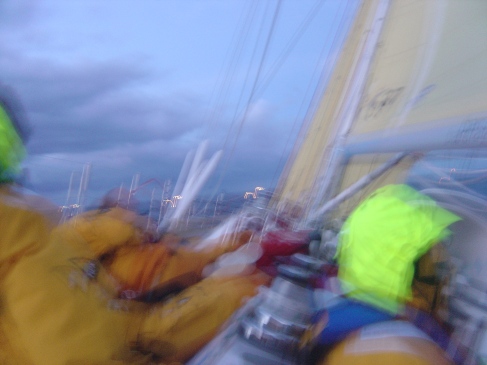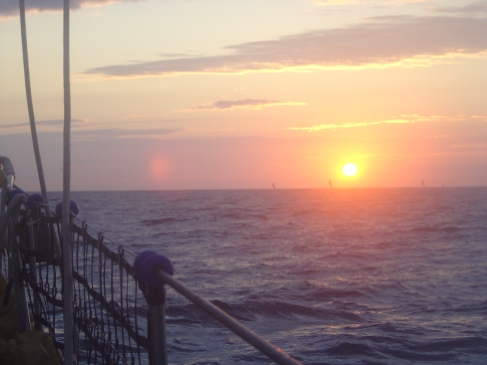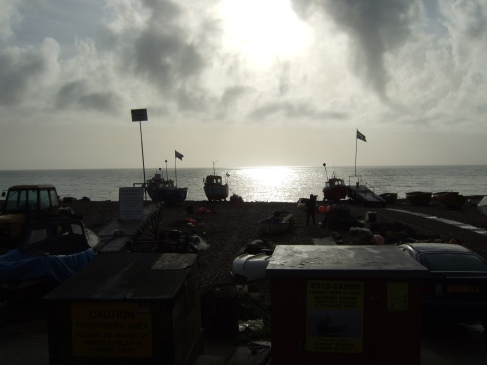Thoughts on seafaring…(reflective post)

I’ve been thinking about fishing and the fishing industry. Who hasn’t this week?
Aside from depleted fish stocks there is the empty reality of depleted fishing communities in most coastal harbours. It’s been a long slow decline.
Local museums tell the story of former vibrant and bustling communities. Fishing boats carried home the catch, and with it the influx of men, movement, activity, transport and industry. There were once 25 open boats fishing for a living off Beer beach; they were employed in drift-netting, long-lining and crabbing, in boats which varied in size from 14ft to 30ft. The catch was carted up the shingle beach and whisked directly to the market at Billingsgate. That would have been at the beginning of the last century. Today there are 4 Beer Luggers taken out for leisure by the Beer Luggers Club. You can see them out on the water on Monday evenings.
It’s a hard life being a fisherman. I can’t imagine the conditions, or the tough seafaring livelihood ingrained from boy to man. I have some limited experience of a softer version of life at sea.
It is a strange thing but when I set off on the Global Challenge 2004-2005 yacht race, I thought I was cutting free. Spiritually, of course, I may have.
I entered the race to have a big adventure, and I was drawn magnetically by the romance of the sea. No boundaries, rolling waves and the danger and excitement of riding a pathless stretch of vast ocean. I got all of this, and albatrosses, and the joyful peace of watching the horizon falling and rising far away with the heaving seascape. However, no one pointed out to me, and I did not consider, the practicalities of day to day life on board a 72 ft yacht for 49 days a leg with 17 other people over 10 months and 30,000 sea miles: cramped, moody, sweaty and exhausted. 
The organisation of life on board a working boat, in my case a competitive sailing yacht, is rigid. To work the boat, the whole crew subscribe to a silent contract of a highly formalised and institutionalised division of labour. We became part of a well- oiled machine. We were disciplined, controlled and controlling, and as time went on, very serious. You might wonder if we hadn’t been better off to save £30,000 and join the Navy; it was only for 10 months and we could jump ship at any time, technically.
For me, the race was a fabulous experience, and yet life on board shifted as the race went on, from fun and friendship to a more serious race. On shore was a different matter…
On a working boat, not only are all tasks broken down into tiny components and allocated into roles, but all activity is scheduled and regulated, planned in advance down to each weighed meal. We ate, slept and socialised in two watches of nine people. We had a four hour four hour six hour watch rotations every day at sea. What this means is that there is a significant lack of choice for any individual person. We all had to embrace the regulated pattern of work, sleep, sustenance, comfort and leisure to be part of the crew. All activity passes in the arena of the 24 hour boat society and all elements of work and social interaction are governed by the same rules. In a way the lack of choice gets you through the physical discomforts and deprivations. There is no option and you are literally adrift, and reliant on each other to touch the other side. The conditions remind you of this each time a huge wave crashes down onto the foredeck.
All this amounts to a most unusual experience in a powerfully constrained environment. Add to the mix: varied winds, soaking clothes, freezing or high temperatures above and below deck, rolling waves, sea salt, limited fresh drinking water, a 45 degree angle, no shower and deprivation of contact with the outside world. You get the idea. It’s a heavy, intense and isolating experience. Crew are driven by their subjective fears, and confused exhaustion, but cling to the rigidity of the system for comfort. Only together could we survive, and perhaps even win (yes, we nearly won). I’m sure this wasn’t the Navy by the way.
When visiting my partner D___ in hospital last year (emergency appendix, he is ok now), I remember thinking how like a ship the hospital is. On watch 24 hours a day, with a similarly rigid hierarchical society. Everyone going about their jobs efficiently, and padding around in soft shoes. An atmosphere of time stopping, unknown outcomes, compressed visits, and a community with it’s own rules existing at a distance from the outside world.
Anyway, I drift. Fish for tea. 

Pingback: Ha! the boot is on the other foot… | The Seatonist